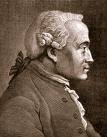III.c. Förster’s derivation of Kant’s ethics from his late metaphysics

We continue with the problem of theoretical and practical reason in Kant. Morality, for the Enlightenment German, is essentially a matter of Reason, which enables us to follow a universal moral law. Förster’s approach is first to raise the question of “the Subject as Person”: “What makes us persons in the Kantian sense is that we are agents whose reason can be practical of itself and be motivated by nothing but respect for the moral law.” This again suggests the non-metaphysical ethics of the Chinese, in which Confucian morals are simply givens.
Moreover, says Kant, “The principle of right in the categorical imperative makes necessary the totality [das All] as absolute unity [a point at which Schelling and Hegel emerge from Kant]. In the Critique of Pure Reason, Kant’s moral argument commences with a discussion of the idea of a moral world. A moral world [I continue to quote Förster in summary of Kant] is a possible world that would be realized by us, if our freedom were in accordance with the moral law, which for Kant is seemingly implicit.” Some regard ethics as based upon freedom of choice.
What, then, is the relation between the moral law and Heaven (T’ien), or God? Förster: “Kant opposes to the synthetic judgment that asserts the existence of God ‘outside of mankind’ another sentence that he characterizes as ‘analytic.’ He describes it thus: ‘Agreement with the mere idea of a moral lawgiver,’ for all human beings is indeed identical with the moral concept of duty in general, and to this extent the proposition commanding the agreement is analytic.” He appeals, then, to analytic reason in quest of a universal God. For the Chinese T’ien merely exists.
“And the belief in such a being,” says Kant explicitly, “really contains no mystery, since it expresses solely God’s moral bearing toward the human race. It also represents itself,” he adds, “to human reason everywhere and is therefore to be met with in the religions of most civilized peoples.” Are the Chinese paintings of Fan Kuan, Kuo Hsi and Li T’ang, these massive cosmological emblems as I had called them, based upon an implicit belief in Heaven (T’ien), and is this part of their universal appeal? Or are they merely unified artistic compositions?
It appears to me that they represent a collective unity of forces, physical, personal and moral. Says Kant (in Förster’s summary): “I not only posit myself as an object, I also constitute myself as a person, as a being whose actions can be imputed to me. This, Kant claims, presupposes a collective unity of forces, albeit not of matter, but of moral-practical reason.” In Kant’s own words: “There is an all-comprehending nature . . . in which reason coordinates all physical relations into unity [an “All,” that is, which, in German, can also mean a Cosmos].
Kant continues: “There is a universally ruling operative cause with freedom in rational beings, and with the latter, a categorical imperative which connects them all, and, with that, in turn an all-embracing, morally commanding, original being — a God. . . There is a God: for there is in moral-practical reason a categorical imperative, which exceeds to all rational world-beings and through which all world-beings are united.” Kant, in defining God in reasonable and moral, rather than mystical, terms is again similar to the Chinese, if not in his argumentation.
There follows Förster’s gloss (I abbreviate): “Reason comes into being (generally speaking) when the original spontaneity of the power of representation limits itself or imposes laws upon itself. . . . In this way I recognize through experience my own practical freedom as one of nature’s causes, namely as a causality of reason in the determination of my will.” Man does influence nature, as does the Chinese painter, by inserting his force into his representation of Nature’s forces. ’Tis a human God, one, we might say, who derives from moving forces.
Förster: “What is postulated in the sentence, ‘God exits,’ then, is not properly the existence of a being independent of human thought and action (this would be self-contradictory, since God is analytically connected with the concept of duty). What is thus postulated is that which endows practical reason’s ideas of right with ‘moving force,’ making possible their unity.” “Est Deus in nobis,” says Kant, quoting Ovid, “It cannot be denied that such a being exists; yet it cannot be asserted that He exists outside rationally thinking man.” An un-Chinese conception.
Förster helps us link back from Kant’s moral philosophy to his philosophy of perception by quoting him to the effect that the ideal of God is nothing other than “pure practical reason in its personality, with reason’s moving forces in respect to world-beings and their forces.” Förster adds: “Universal attraction requires matter in space. If space were empty, there would be no attraction, but also no experience. With this account,” he says in conclusion, “Kant has also, finally, solved the problem of the unity of theoretical and practical reason.”